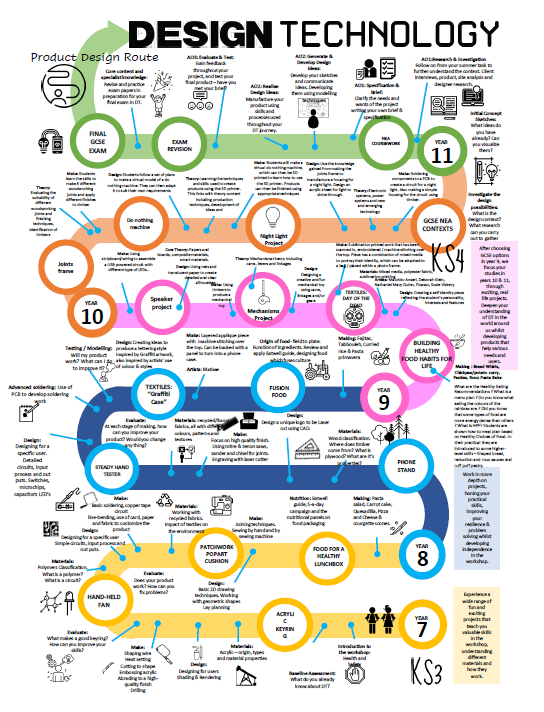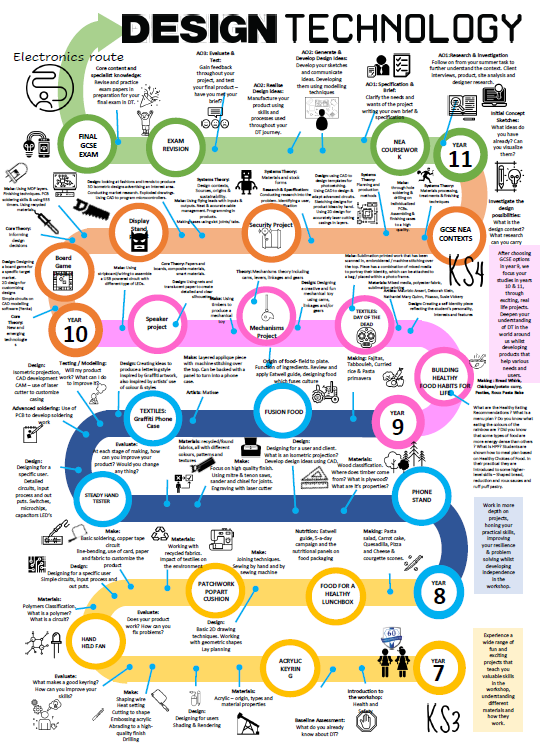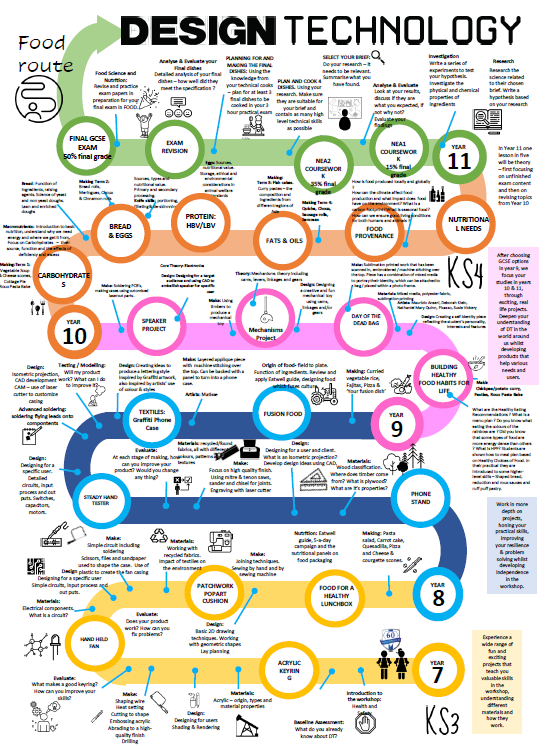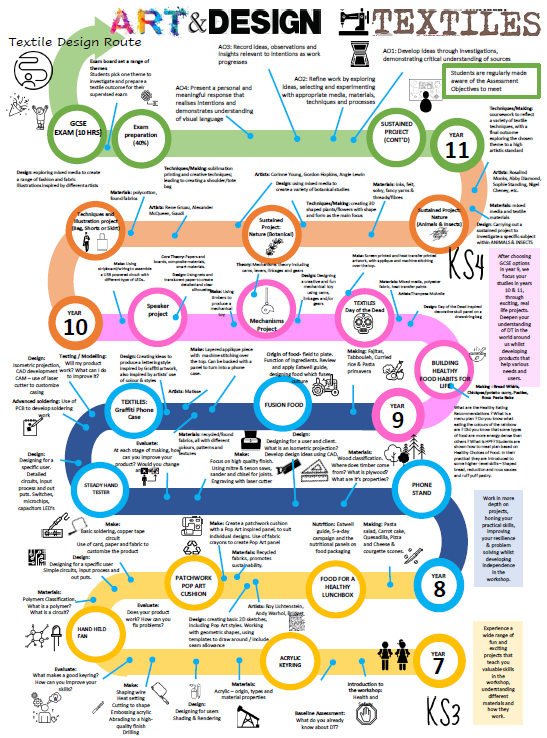Design Technology
In Design Technology our curriculum aims to prepare young people to participate confidently and successfully in an increasingly technological world. Our students have the opportunity to work creatively as well as problem solve when designing and when making, they can then apply technical and practical expertise to develop their ideas and realise an outcome to meet a user’s needs.
Our Curriculum
In Years 7-9 all students spend 8 weeks each in 4 material areas – Electronics, Food, Product Design and Textiles. In each area we introduce students to specialist equipment, teaching them how to use it safely to produce high quality outcomes.
Year 7 is our foundation year – students work with new equipment in each area developing a new skill set which will form the ground floor on which to build their skills for the rest of their time at Guilsborough Academy.
In Years 8 & 9 they are introduced to more complex techniques and equipment in a safe and structured environment. It is important to us that students are able to design and make unique products for their individual user. At the same time students will be developing an understanding of drawing and rendering techniques, different raw materials their origin and properties and their impact on the environment.
Whilst in Food & Nutrition students make dishes on the theme of ‘A Healthy Lunchbox’, ‘Fusion Food’ and ‘Food is Energy’. To support their subject knowledge student’s begin their learning about Food Nutrition and Health.


Design is a funny word. Some people think design means how it looks.
But of course, if you look deeper, it’s really how it works.”
Steve Jobs
“Technology makes possibilities. Design makes solutions.”
John Maeda
The Framework of our intent
Our curriculum aims are to prepare young people to participate confidently and successfully in an increasingly technological world
Here are some of the key features you can expect:
Students will gain awareness of and learn from wider influences on Design and Technology including historical, social, cultural, environmental and economic factors. Young people gain the opportunity to work creatively as well as problem solve when designing and when making, they can then apply technical and practical expertise to develop their ideas. Students have the opportunity to a broad range of design processes, materials, techniques and equipment.
Students benefit from the study of Design and Technology in a range of ways, not only does this subject allow them to be creative, but they learn across a range of subjects including Maths, Science, Geography and History as well as ICT. They also learn how to be aware, considerate and understand the needs of others, they learn how to vary approaches when considering people of different cultures and faiths and how this can impact on the design and manufacture of products. Students of Design and Technology learn important soft skills – self and workspace organisation, working with others, keeping to deadlines, working independently, self-motivation, assessment of risk and the ethos of resilience.
The single aspirational point to conclude
Quite simply, we want to be known for preparing students to participate confidently and successfully in an increasingly technological world, to become critical and confident consumers. We hope to ignite creativity, independence and an awareness of the needs of others in our students.
In Year 9 students will be able to opt into the following subject areas in the Design Technology Department:
GCSE Food Preparation and Nutrition
In Years 9 and 10 students work on themed projects. In each project there will be a central focus, increasing their knowledge and experience, combining ingredients and learning new methods of making whilst considering the function and nutritional value of each ingredient.
Bullet point summary:
- Prepare students to participate in a technological world:
- KS3 – use of new technology in making – laser cutter
- Discussion about the influence of new technology on the environment – materials, 5 R’s
- KS4&5: Exam curriculum covering new technologies.
- Use of 3D printer and laser cutter for projects and coursework
- Learn from wider influences etc:
KS3 – homework on designers, discussion of environmental impact. Making products to fulfil user preferences
KS4 & 5 Exam curriculum – linked to historical, social, cultural, environmental and economic factors.
- Work creatively, problem solve, apply technical and practical expertise. – we do this in all of our practical projects. If you are struggling to work out how we do this let me know and we can have a chat 😊
- Explore technical designing and making principles, with a broad range of processes and materials – the important thing here is that we start with basic skills in Y7 and we build on this for the subsequent years – increasing the difficulty as students progress along the years.
- Benefits of studying DT:
Cross curricular links –
- Maths: weighing, measuring, calculation of areas, ratio of ingredients
- Science: function of ingredients, Yeast/bacteria, dextrinization, nutrition
- PE: Healthy eating, function of foods linked to energy generation
- Geography: environmental impact of raw materials, the relationship between food and the environment. Climate change, food security
- History – Designers and Design movements. Cultural influences
- IT. CAD, excel and ppt.
Understanding the needs of others – user needs – appreciation of the needs of others relating to a variety of individual needs such as age, ability, faith
Soft skills – working to deadlines, working in a group, graphicacy, workspace organisation, assessment of risk and accountability. Product analysis – the ability to evaluate one product against another and make choices.
Course content:
- Nutrition & Health: Protein
- Pastry: Fats & Oils, Eggs
- Bread: Carbohydrates
- Heat transfer: Cooking methods
- Food Safety
- Food Provenance
The theory side of the course is based on the core principles of -
- Food Nutrition and Health
- Food Science
- Food Safety
- Food Choice
- Food Provenance

GCSE Electronics
During Year 10, students will work on short projects to teach them a wide variety of making skills. Each project will introduce them to components soldering and construction skills, building a resource booklet that students can use when designing and developing their GCSE product. This will also include some theory content. With each new project, students will learn about the most suitable materials and the potential environmental impact of design.



Course Content:
Core: Each of the Design Technology subjects taught at GCSE (Electronics & Product Design) contain a core materials element, all students will develop a basic understanding of a wide range of materials so that they have the option to combine materials in their final GCSE coursework product. These core areas will be integrated within the projects in years 9 and 10.
Project 1: Board Game This item is for a family or group of people. Students will design a board game that includes a timed element (either an original idea or a unique take on a classic). Students will make use of a 555 timer and assemble a PCB using advanced soldering techniques. The timer is housed in a customised laser cut casing.
Project 2: Advertising Displays
Students will be introduced to programming and computer control. Students will use software to program a visual display to help advertise a product, film or item of their choice. The product is highly customisable and can use a wide range of types of LED and Sounds.
Project 3: Security alarm
Students will design and make a security alarm to help protect a room of their choice. Students will design (using CAD) and make a PCB from scratch using an etch tank and photoetching. Students will be able to work with a range of materials to construct a case; selecting appropriate processes including vacuum forming & laser cutting.
GCSE Product Design
In Year 10 students’ complete projects to help them develop a range of skills, work with a variety of materials and processes and gain an understanding of how they work to develop their own style and pathway. Linked to each of the projects will be the theory necessary to support their understanding of the materials and processes as well as prepare them for examination in Y11. All materials are made available including card, fabrics, metal wood and plastic.
Course Content:
Core: Each of the Design Technology subjects taught at GCSE(Electronics & Product Design) contain a core materials element, all students will develop a basic understanding of a wide range of materials so that they have the option to combine materials in their final GCSE coursework product. These core areas will be integrated within the projects in years 9 and 10.
Project 1: Jewellery
During the project, students will develop their creative design skills and modelling skills, they will learn how to write their own success criteria and to evaluate and develop their own work. They will also build their materials knowledge.
Project 2: Cad/Cam
Students will use this project to develop their understanding of modern technologies in designing and manufacturing. They will use a CAD programme and the laser cutter to make a simple project, and will focus on producing a high quality finish on that product.
Project 3: Tool Box
All students will produce an open top pine storage box and learn to communicate designs through engineering drawings. They will learn how to ‘order’ materials for their product, and how to utilise a range of wood joints.


GCSE Textile Design
In Year 10 students will complete a variety of projects and take creative risks experimenting with materials, increasing confidence in their ability, bringing their artistic skills with textile elements. We continue to develop observational drawing skills, and begin to look at the assessment objectives for the GCSE course.


Course Content:
Project 1: Day of the Dead
Project 2: Fashion Illustration & a Shoulder Bag
Project 3: Botanical
Project 4: Animals & Insects
Our Design Technology curriculum journey shows how we develop the skills of our students and the topics the students cover in each year. Click on the learning journeys below to view our food, in more detail.




What is Design Technology like at Guilsborough?
Please watch our short video to see what studying Design Technology at Guilsborough is like.
If you like hands on activities my electronics lessons are enjoyable. I really like the freedom to design in the Years 7 and 8 projects
Tom Year 9 student
I am thankful for all the delicious food you have shown me how to cook. Not only that, you have also shown me the importance of Food and Healthy Nutrition in my life. I could not have asked for a better experience, you have inspired my new love of creating interesting dishes to cook and eat.
Pippa, Year 11 student
Textiles is a supportive atmosphere where you are free to explore your creativity and encouraged to improve your skills no matter your artistic ability, I came away with so much inspiration and so many projects I was proud of as well as so many lovely memories of the lessons.
Maddy, Year 13 student
Product design at A-level offers a lot of freedom over what you can design and has taught me essential problem-solving skills. The theory work also encourages you to be more aware of the world around you.
Libby, Year 12 student
Where will Design Technology take me past Year 11?
SIXTH FORM
By studying Design Technology, students will be able to build up their creativity, problem solving, planning, and evaluation skills. Since many projects are done via group work, they will also gain communication and teamwork skills. Subjects you may consider studying in sixth form if you have enjoyed Design Technology are;
The skills learnt in GCSE Design Technology will be useful in all these areas but can also be applied in most routes for further education.
Please click on individual courses to explore them at Guilsborough Sixth Form.
CAREERS
Design skills and the ability to visualise new ideas can be useful in many job families such as
- marketing
- sales and advertising
- arts crafts and design
- broadcast media and performing arts
- journalism and publishing
- construction
- engineering and manufacturing
Some of our past students who have studied Design Technology have .....
Please visit out Careers Guidance page for more information
Useful resources to support learning in Design Technology
These resources are useful for students to help consolidate knowledge learnt in lessons and to aid revision ;
Electronics
BBC Bitesize
BBC Bitesize is an excellent website which covers theory information needed for GCSE Electronics
Explore BBC Bitesize by clicking here.
Technology Student
This website contains numerous information sheets and exercises to enhance the study and understanding of Deisgn Technology
Explore Technology Student by clicking here.
Edutek
This site is packed with Electronic circuits and projects for students for KS3, KS4 and KS5

Explore Edutek by clicking here.
Food Preparation & Nutrition
AQA Subject Page
The AQA subject page contains information about the course and the specification. It also contains useful past assessment material

Explore the AQA subject page by clicking here.
British Nutrition Foundation
The British Nutrition Foundation website contains information about nutrition and healthy sustainable diets
Explore the British Nutrition Foundation website by clicking here.
STEM Learning
The STEM Learning website contains useful information and resources to explore the content of Food and Nutrition
Explore the STEM learning website by clicking here.
Product Design
Design and Technology Association
The Design and Technology Association have an information and helpful video for parents and students.

Explore the Design and Technology Association website by clicking here.
Edexcel Subject Page
The Edexcel subject page contains information about the course and the specification. It also contains useful past assessment material.

Explore the Edexcel subject page site here.
Technology Student
This website contains numerous information sheets and exercises to enhance the study and understanding of Deisgn Technology
Explore Technology Student by clicking here.
BBC Bitesize
BBC Bitesize is an excellent website which covers theory information needed for GCSE Product Design
Explore BBC Bitesize by clicking here.
Textiles
Pinterest is useful for students to research artists, look for inspiration and develop their ideas
Explore Pinterest by clicking here.
Guilsborough Textiles Team
Resources, examples, video guides and PowerPoints for Textiles will be on Textiles area of Microsoft Teams






